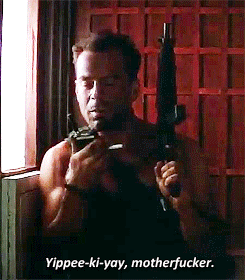DAN MAZURScript Analyst, Lawrence Gordon Productions (1986–1988)Director of Creative Affairs, Lawrence Gordon Productions (1988–1989)Vice President of Creative Affairs, Largo Productions (1989–1991)
Larry [Gordon] really had a studio system approach where you get the script ready to go, you get the green light on the movie, you hire the director, and then you cast it. It keeps too many competing power centers from coming in… Once the director was in place, the star roles would only then be offered to actors. Larry did not want a star dictating the choice of his director, which he felt was the producer’s prerogative… I was present for some of the casting meetings, and as I remember the part was offered to Al Pacino and Richard Gere.
JOHN MCTIERNANDirector, Die Hard (1988)
When I first started working on it, they were talking about Richard Gere. The part was very buttoned down. He’s wearing a sport jacket, and he’s very suave and sophisticated and all that stuff. It was a sort of Ian Fleming hero, the gentleman man of action.
BEAU MARKSProduction Manager, Die Hard (1988)
All those folks were too good to make an action film. Action films were what B-stars did, not A-stars. But they were becoming the A-pictures, and they were the ones that were starting to make all the money.
STEVEN E. DE SOUZAWriter, Die Hard (1988)
They went to Arnold [Schwarzenegger]. They went to Sly, who turned it down. They went to Richard Gere—turned it down. They went to James Caan—turned it down. They went to Burt Reynolds, and all of these people rejected it because, remember, this is 1987. You had all these Rambo movies. We’ve had Commando, Predator, and in the wake of all of these, the hero, they said, was like a pussy. The reaction? “This guy’s no hero.” Right? In desperation, they went to Bruce Willis.
JEB STUARTWriter, Die Hard (1988)
To a lot of people it was like, “Are you kidding me?”
ARNOLD RIFKINCo-founding partner, Triad Artists (1984–1992)
Bruce was just in heaven shooting movies. His second movie was Sunset. Blake [Edwards] had gone to him behind my back after [his first movie] Blind Date [released in March of 1987] and gave him a script, and Bruce embraced this movie, the story of Tom Mix. He was terrified that he wouldn’t have a film career. That was what was sitting on my shoulders as an agent.
KELLETT TIGHEExecutive Assistant, Lawrence Gordon Productions (1984–1990)
Blind Date was funny, but it did horrible with critics. We used to call him, “One Take Blake.”
JOHN MCTIERNAN
On a little screen with low resolution, Bruce’s smart-aleck stuff was funny. But, when you could really see him on a big screen with high resolution, you could see his eyes. You could really see his face. It was offensive. He was doing his stock TV character. That had failed essentially because he came across unlikable, a pain in the ass.
ARNOLD RIFKIN
To think Fox was prescient in coming to Bruce? No. Nobody wanted to do the movie. First of all, it sounded like a battery for Sears. It’s true, right? Sears was then at its height of selling batteries. They said, “We may change the title. Who knows?” Bruce thought it was over. He thought he’d be in television for the rest of his career. You know, your first film, hit or not hit, you get a pass no matter what. The second film, that’s what’s remaining. Are you going to be around for a while, or are you a one-hit wonder?
GLENN GORDON CARONCreator, Moonlighting (1985–1989)
Also it was a different movie culture back then. You could make a movie every year and a half or every two years and still be considered a vital star. There wasn’t the platter of entertainment choices that there are now. A movie would come out and would sit in the theaters for three or four months.
ARNOLD RIFKIN
I needed a number that would make him the highest paid actor for a minute in time. That would be the justification if it didn’t work. If it worked, the rest was irrelevant.
JACKIE BURCHCasting Director, Die Hard (1988)
Arnold said, “I’ll give you Bruce for $5 million,” which was unheard of because Bruce had no quote like that.

ARNOLD RIFKIN
I kept saying to [Fox chief negotiator] Leon Brachman, “That’s the number.” He’d come back with three [million] or two and a half [million]. Bruce, to his credit, asked me what I thought. I said, “Here’s the reality. You don’t have the money, so you can’t spend it, so you’re not out the money if you never had it. If we get it, you’re the highest paid actor in the world. If you don’t get it, you’ve got enough money to go to Hawaii on hiatus and no one will ever know the difference.” There was a seminal moment where there was a number on the table. There were people who thought he should take it, and they got their chance to voice their opinions. Bruce asked me mine. I just said, “Look, I’m not going to tell you I know for a fact we’re going to get it. It’s a risk.” He said, “Go for it.”
JACKIE BURCH
At that time he had no credits in the movies. The movie world and the TV world were different. If you had the highest quotes in TV, they didn’t give a damn. It was like “What’s your movie quote?” Now, it doesn’t matter—it’s all kind of gone into one pot. But at that time movie quotes mattered.
ARNOLD RIFKIN
I went back into Leon’s office and said, “I appreciate very much your offer. We’re going to pass.” I remember what Leon said to me: “Arnold, if we give you the $5 million, is there anything else you’ve left out?” I said, “I don’t know. You tell me.” He came back in a few minutes later and said, “You have it.” That was it.
STEVEN E. DE SOUZA
He got the astonishing sum of $5 million, which made everybody’s salaries in Hollywood [increase] the next day. Literally, the next day Richard Gere said, “How did this guy get $5 million, which is more than I got from my last picture and I’ve been nominated for awards?”
HART BOCHNERActor, Die Hard (1988)
In a way, it changed the way movies were made because suddenly actors were getting five, 10, 20 million dollars.
ARNOLD RIFKIN
I give a lot of credit to Bruce in the sense that he believed in what I was sharing with him. He trusted my commitment to him. He was a big enough man to accept the fact that we could lose. That’s a nice way of saying Bruce was a gambler, and that was to his credit.
BEAU MARKS
Stallone was getting more than that at the time anyway. Everybody blamed Andy [Vajna] and Mario [Kassar] at Carolco [Pictures] for inflating actors’ salaries. They were the ones who set the bar on overpaying actors, but they did it because they had foreign markets they had to presell to get the money.

ANDY VAJNACo-founder, Carolco Pictures (1976–1996)
For Rambo II, I remember Stallone got $7 million. The reason for our being able to do that was the stars were all supposed to get a percentage of the studios’ foreign and domestic box offices, but Carolco wasn’t able to make gross deals. Our distribution method was totally different. We did what we figured the picture might do, and we bought out their rights to the gross… They blamed us for a lot. They said we screwed up the whole market, but the point is that, say we made a deal with Arnold and paid him $14 million for Terminator 3—actually, he got an airplane because he didn’t want the cash—but there was no back end, it didn’t matter if you paid in cash or if you paid in kind, you know?
ARNOLD RIFKIN
People were livid with me. I got such backlash from it. “What did you do? What are you thinking?” I said, “I’m working for my client. That’s what I do for a living.” For me to have to defend it would have been absurd. There were clients at other agencies that were calling up their agents and saying, “How does this guy get that fee, and I’m on a sequel to a successful film that has made a lot of money, and I’m making less than he is, and he’s coming off of a TV series?”
GLENN GORDON CARON
I remember coming in to work and Bruce saying to me, “I got another movie,” because we thought maybe that was the end of the movies for him. He already shot two. He said, “I want to do this movie Die Hard.” And I said, “Oh, don’t do that.” I pleaded with him. “They’re going to laugh you off the screen. That’s a Schwarzenegger movie.” That was my perception at the time, and he said, “Oh, Glenn, it doesn’t matter. They’re paying me so much money that even if it doesn’t work out I’m okay.”






